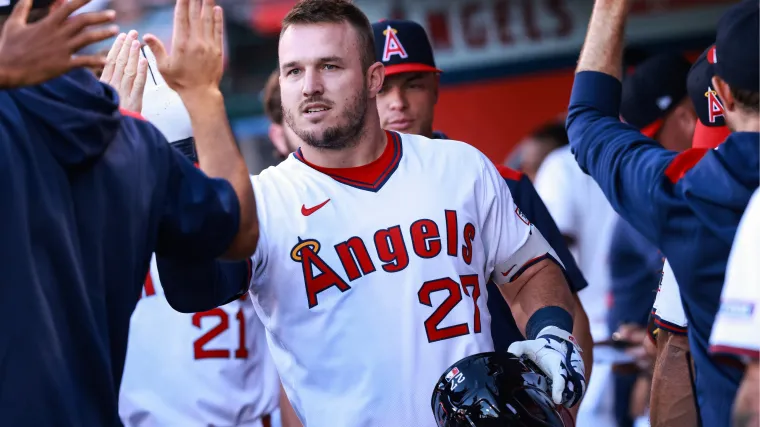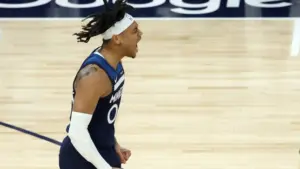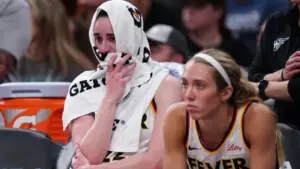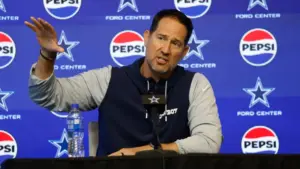Every summer, MLB pauses action in July, giving the majority of the league a break to rest up for the second part of the season. The league’s best, however, get less time off because they participate in the annual MLB All-Star Game and related festivities.
Unlike the NFL’s Pro Bowl, but similar to the NBA’s All-Star Game, MLB holds its All-Star Game during the regular season. The Midsummer Classic pits the best of the American League against the best of the National League. Historically, the league that won the All-Star Game earned home-field advantage for that year’s World Series. That was changed in 2017, and now the winners of the All-Star Game just get a nice bonus check.
The best player in the All-Star Game is awarded the All-Star Game MVP Award. In its history, it was known as the Arch Ward Memorial Trophy, honoring the inventor of the MLB All-Star Game, and the Commissioner’s Trophy, although that became the name of the World Series Trophy in 1985. Since 2003, the MLB All-Star Game Trophy has been named the Ted Williams Trophy.
Here is a list of every player who has won the MLB All-Star Game MVP Award.
MORE: The longest homers in Home Run Derby history
Every MLB All-Star Game MVP by year
When it was first awarded in 1962, a player from each league won the award; however, since then, there has been only one winner per year, except for 1975. Five players — Willie Mays, Cal Ripken Jr., Gary Carter, Steve Garvey and Mike Trout — have won the MLB All-Star Game MVP Award more than once. Only one player — Derek Jeter — has won the All-Star Game MVP the same year that he won the World Series MVP Award. The White Sox, Tigers, Diamondbacks and Cardinals have never had an All-Star Game MVP. The Nationals technically haven’t, but did when the franchise was still in Montreal as the Expos.
Here is a complete list of every player to win the MLB All-Star Game MVP Award, sorted by year.
| Year | Player | Team | League | Position |
| 1962 | Maury Willis | Dodgers | National | Shortstop |
| 1962 | Leon Wagner | Angels | American | Outfield |
| 1963 | Willie Mays | Giants | National | Outfield |
| 1964 | Johnny Callison | Phillies | National | Outfield |
| 1965 | Juan Marichal | Giants | National | Pitcher |
| 1966 | Brooks Robinson | Orioles | American | Third Base |
| 1967 | Tony Perez | Reds | National | Third Base |
| 1968 | Willie Mays | Giants | National | Outfield |
| 1969 | Willie McCovey | Giants | National | First Base |
| 1970 | Carl Yastrzemski | Red Sox | American | Outfield/First Base |
| 1971 | Frank Robinson | Orioles | American | Outfield |
| 1972 | Joe Morgan | Reds | National | Second Base |
| 1973 | Bobby Bonds | Giants | National | Outfield |
| 1974 | Steve Garvey | Dodgers | National | Outfield |
| 1975 | Bill Madlock | Cubs | National | Third Base |
| Jon Matlack | Mets | National | Pitcher | |
| 1976 | George Foster | Reds | National | Outfield |
| 1977 | Don Sutton | Dodgers | National | Pitcher |
| 1978 | Steve Garvey | Dodgers | National | First Base |
| 1979 | Dave Parker | Pirates | National | Outfield |
| 1980 | Ken Griffey Sr. | Reds | National | Outfielder |
| 1981 | Gary Carter | Expos | National | Catcher |
| 1982 | Dave Concepcion | Reds | National | Shortstop |
| 1983 | Fred Lynn | Angels | American | Outfield |
| 1984 | Gary Carter | Expos | National | Catcher |
| 1985 | LaMarr Hoyt | Padres | National | Pitcher |
| 1986 | Roger Clemens | Red Sox | American | Pitcher |
| 1987 | Tim Raines | Expos | National | Outfield |
| 1988 | Terry Steinbach | Athletics | American | Catcher |
| 1989 | Bo Jackson | Royals | American | Outfield |
| 1990 | Julio Franco | Rangers | American | Second Base |
| 1991 | Cal Ripken Jr. | Orioles | American | Shortstop |
| 1992 | Ken Griffey Jr. | Mariners | American | Outfield |
| 1993 | Kirby Puckett | Twins | American | Outfield |
| 1994 | Fred McGriff | Braves | National | First Base |
| 1995 | Jeff Conine | Marlins | National | Outfield |
| 1996 | Mika Piazza | Dodgers | National | Catcher |
| 1997 | Sandy Alomar Jr. | Guardians | American | Catchers |
| 1998 | Roberto Alomar | Orioles | American | Second Base |
| 1999 | Pedro Martinez | Red Sox | American | Pitcher |
| 2000 | Derek Jeter | Yankees | American | Shortstop |
| 2001 | Cal Ripken Jr. | Orioles | American | Shortstop/Third Base |
| 2002 | No winner, ended in tie | — | — | — |
| 2003 | Garrett Anderson | Angels | American | Outfield |
| 2004 | Alfonso Soriano | Rangers | American | Second Base |
| 2005 | Miguel Tejada | Orioles | American | Shortstop |
| 2006 | Michael Young | Rangers | American | Shortstop |
| 2007 | Ichiro Suzuki | Mariners | American | Outfield |
| 2008 | J.D. Drew | Red Sox | American | Outfield |
| 2009 | Carl Crawford | Rays | American | Outfield |
| 2010 | Brian McCann | Braves | National | Catcher |
| 2011 | Prince Fielder | Brewers | National | First Base |
| 2012 | Melky Cabrera | Giants | National | Outfield |
| 2013 | Mariano Rivera | Yankees | American | Pitcher |
| 2014 | Mike Trout | Angels | American | Outfield |
| 2015 | Mike Trout | Angels | American | Outfield |
| 2016 | Eric Hosmer | Royals | American | First Base |
| 2017 | Robinson Cano | Mariners | American | Second Base |
| 2018 | Alex Bregman | Astros | American | Third Base |
| 2019 | Shane Bieber | Guardians | American | Pitcher |
| 2020 | All-Star Game Not Held | — | — | — |
| 2021 | Vladimir Guerrero Jr. | Blue Jays | American | First Base |
| 2022 | Giancarlo Stanton | Yankees | American | Outfield |
| 2023 | Elias Diaz | Rockies | National | Catcher |
| 2024 | Jarren Duran | Red Sox | American | Outfielder |
| 2025 | Kyle Schwarber | Phillies | National | Designated Hitter |
MORE: MLB All-Star Game extra innings rule, explained
Which players have won the most MLB All-Star Game MVPs?
No player has ever been named the All-Star Game MVP three times. There have been five players in history who have won the award twice.
- Willie Mays: 1963, 1968
- Steve Garvey: 1974, 1978
- Gary Carter: 1981, 1984
- Cal Ripken Jr.: 1991, 2001
- Mike Trout: 2014, 2015
In 1963, Mays earned the Award, finishing 1-3 with two RBI and a walk. In 1968, the National League mustered only five hits. Mays led off for the NL and finished 1-4. He had a single in his first at-bat, took second on an error, third on a wild pitch and scored the lone run on a double play.
Garvey ripped a single in his first at-bat in the 1974 MLB All-Star Game and followed it up with an RBI double in the fourth inning. Despite striking out to Catfish Hunter and popping out to Rollie Fingers in his final two at-bats, he was named the NL’s MVP. In 1978, Garvey walked in his first at-bat, drove in two runs with a single in his second, had a ground out and then a triple to end his day in the NL’s 7-3 win over the AL.
Gary Carter launched two home runs in 1981 to earn the award. In 1984, he belted another homerun, and this one put the NL up 2-1 and helped them win the game 3-1 when it was all said and done.
Ripken Jr.’s first All-Star Game MVP Award came in 1991 when he hit a three-run home run. It took 10 years for him to earn his next All-Star Game MVP Award, but in 2001, he had a solo home run. Ripken Jr. wasn’t the only one to hit one for the AL, but that was his final season in the major leagues.
Trout went 2-3 with a double, a triple and two RBI to win his first All-Star Game MVP Award in 2014. He followed it up in 2015 with a leadoff home run to earn his second ASG MVP Award. Trout is the only player to win the MLB All-Star Game MVP Award in consecutive years.
MORE: Complete list of every Home Run Derby winner by year
Which team has produced the most MLB All-Star Game MVPs
Not every team has had an All-Star Game MVP in their history. In fact, the White Sox, Tigers, Diamondbacks and Cardinals have never had an All-Star Game MVP. The Nationals technically haven’t, but did when the franchise was still in Montreal as the Expo, thanks to two-time winner Gary Carter and Tim Raines.
While four franchises haven’t had an All-Star Game MVPs, two franchises have had six winners of the award. Four other teams have had five players win the award. Four of the six teams with at least five winners have two-time winners, while two of the teams each have five individual winners of the ASG MVP Award, meaning you could argue that they technically have the most winners.
| Team | Number (Players) |
| Orioles | 6 (Cal Ripken Jr x2, Brooks Robinson, Frank Robinson, Roberto Alomar, Miguel Tejada) |
| Giants | 6 (Willie Mays x2, Juan Marichal, Willie McCovey, Bobby Bonds, Melky Cabrera) |
| Angels | 5 (Mike Trout x2, Garret Anderson, Fred Lynn, Leon Wagner |
| Dodgers | 5 (Steve Garvey x2, Mike Piazza, Maury Wills, Don Sutton) |
| Reds | 5 (Tony Perez, Joe Morgan, George Foster, Ken Griffey Sr., Dave Concepcion) |
| Red Sox | 5 (Carl Yastrzemski, Roger Clemens, Pedro Martinez, J.D. Drew, Jarren Duran) |
MORE: Number of rounds, time limits and more to know about Home Run Derby rules
Who is the youngest MLB All-Star Game MVP?
Vladimir Guerrero Jr. was named the MLB All-Star Game MVP in 2021, making him the youngest to win the award in history. He was 22 years and 119 days old at the time of winning. Guerrero Jr. helped the American League to a 5-2 victory over the National League. He launched a solo home run to deep left field off of Corbin Burnes that put the AL up 2-0. Guerrero Jr. later picked up another RBI on a groundout. While he wasn’t the only American League player with a home run — Mike Zunino hit a solo shot in the top of the sixth inning — he was the only player with multiple RBI.
MORE: Has anyone won more than one Home Run Derby?
Who is the oldest MLB All-Star Game MVP?
The oldest MLB All-Star Game MVP is Yankees legend Mariano Rivera. He was named to the American League All-Star team 13 times, but was only ever MVP once. It just so happened that it came during Rivera’s final season of his career, likely leading to why he won. In the game itself, the American League won 3-0, but Rivera didn’t even get the save. He got a hold in the eighth inning before getting the recognition deserving of a legend, leaving the mound and allowing Joe Nathan to get the save in the ninth inning. Rivera faced three batters, threw 16 pitches and had no strikeouts.
MORE: Breaking down Home Run Derby records
How is the All-Star Game MVP determined?
The All-Star Game MVP Award goes to the player who theoretically had the biggest impact on the game, but really, it is all a vote. 80% of the vote comes from the writers and broadcasters at the game, with the other 20% coming from an online fan vote. As of 2025, the National League has won the All-Star Game MVP Award 28 times, while the American League has had 35 winners.
MORE: Why did Ken Griffey Jr. wear his hat backwards during the Home Run Derby?






